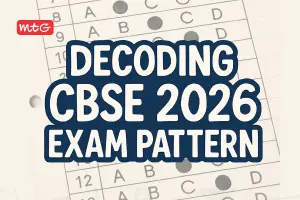
The results of Class 10 Board exams play a huge role in shaping your career and future. This is because your academic career relies greatly on your Class 10 board exam marks. If you score 90+ marks in board exams, you are more than likely to get the stream of your choice. Your favourite stream is the key to the career of your dream, which could be engineering, medical, defense, teaching, law, etc. While board scores don’t decide the future outcome of a student, they certainly decide if you would be able to get closer on the path to your dream career.
Sample Papers play a major role in helping you score 90+ in board exams as they familiarize you with the types of questions usually asked in the board exams. This lets you prepare accordingly and answer in the most effective manner.
Understanding the Role of Sample Papers
Sample papers are the replica of actual question papers comprising the same exam pattern and marking scheme. However, students should only take them as a medium to practice for their revision rather than relying on them completely for their actual exams. There’s hardly any chance of any question appearing from sample papers in real exams. Nevertheless, questions resembling the same set of questions in sample papers can appear in the actual board exams.
Important – CBSE Class 10 Sample Papers 2024-2025 – Free PDF Download
How Sample Papers Differ from Previous Year Papers
Some students get confused between sample papers and previous years’ papers. There is a major difference between the two. Sample papers consist of questions based on the blueprint of the actual exam, but they don’t comprise any questions that appeared in any previous exam. On the other hand, previous years’ papers consist of question papers that have appeared previously, and they have actual questions that appeared in board exams.
Students should practice sample papers to get an idea of the latest exam pattern and marking scheme. On the other hand, previous years’ papers familiarize you with the level of difficulty of questions and the solutions given in those papers help you find solutions with the right approach.
Latest – How Many Hours Should You Study in Class 10?
How Percentage is Calculated in CBSE Class 10 CGPA
Key Reasons to Use Sample Papers for Scoring 90+
- Familiarity with the Exam Pattern
Sample papers ease your doubts and confusion by making you accustomed to the latest question typologies and marking schemes. This plays a huge role in your board exams preparation besides raising confidence.
- Identifying Important Topics
Sample papers also help you pinpoint frequently asked topics and help you prepare yourself for questions asked on similar topics.
- Time Management Practice
Sample papers play a vital role in improving time management as the solutions provided in them apprise you of the time and effort required for efficient practice. The solutions make us accustomed to the right approach to solving questions. Learn to analyse previous years’ papers and their detailed solutions. Implement the time-saving methods and tricks to help you solve questions within a set time frame. Then apply those methods and tricks to the questions in the sample papers. This will ensure your mastery in solving different question typologies in the stipulated timeframe.
- Boosting Confidence and Reducing Exam Anxiety
Once you master practicing sample papers you will start building confidence and become ready to face any kind of question for board exams.
- Self-Evaluation and Identifying Weak Areas
Sample papers are the best resources to evaluate performance for board exams. They give you a fair idea of how prepared you are for the exam. Sample papers work as a compass to analyze mistakes and give ideas to work on the weak areas.
How to Use Sample Papers Effectively
- Setting a Timetable for Sample Paper Practice
Don’t forget to incorporate sample paper practice into a study plan. Practice as many sample papers as possible till you perfect the questions. You can solve a sample paper every week and analyse where you went wrong. Then try to learn from your previous mistake and make sure you don’t make that mistake again.
- Simulating the Real Exam Environment
You should make sure to practice sample papers in a quiet, distraction-free space. This will give you a real exam-like environment and use a timer to replicate exam conditions. This will also help you deal with pressure and become accustomed to the exam.
- Reviewing and Learning from Mistakes
Learn to review your incorrect answers and go through the right ones.
Learn the right approach to solve questions you find difficult.
Learn to make notes from the mistakes made in sample papers. This will help you a lot in the upcoming board exams.
Success Story

ADYASHA SYAM (99%)
SAI International School, Bhubaneswar
Odisha’s state topper in Humanities
Adyasha Syam, Odisha’s state topper in Humanities from SAI International School, Bhubaneswar, was raised by her mother and grandparents, and she found their support invaluable.
Her study strategy involved thoroughly going through NCERT content, making her own short notes, and extensively revising them.
“I also solved as many sample papers as I could, and all the past question papers of CBSE. For the boards, I didn’t take coaching,” she says.
After her college entrance exams in December, she dedicated herself fully to board exam preparation, studying for around 12 hours a day.
“For the first month, I went through the textbooks word by word, summarised every chapter in a page each using keywords, and kept revising those notes. For the rest of the days, my time was spent doing as many sample papers as I could,” says the CBSE topper.
Reference from – https://www.indiatoday.in/
Common Mistakes Students Make While Using Sample Papers
- One of the most common mistakes students make while using sample papers is their inability to attempt questions in a time-bound manner. Also, many students fail to analyse errors while going through the solutions.
- Learn to solve sample papers with a stopwatch and assign a certain time limit to solve the entire question paper. You can also assign a time limit to particular questions to check your speed in writing lengthy answers. This will help you assess your preparations well.
Where to Find Reliable Sample Papers
While there are a lot of publishers in the market claiming to offer the best sample papers, only a few can boast to offer sample papers based on the exact blueprint released by CBSE. MTG is one such publisher known for offering the best sample papers based on CBSE’s latest blueprint.
How to Choose the Right Sample Papers for Your Board Exam
It is recommended that students should choose sample papers based on syllabus and difficulty level, not on the tall claims of some random publishing house. Students should only choose books that offer questions based on the difficulty level and syllabus of the actual exam.
Conclusion
Sample papers play a key role in making you aware of the latest exam pattern and marking scheme. Solving sample papers will help you avoid any surprising elements in the real board exam. Don’t forget that your board score depends on your dedication, devotion, and practice time. The more you practice the more your grip tightens on the board exams. Practice till you ace it.
FAQs on Why you Need Sample Papers to Score 90+ in Boards
- Are Sample Papers Enough to Score 90+ in Board Exams?
While sample papers help you in getting the exact blueprint of the exam, you must keep your fundamentals right. This will definitely help you score 90+ in board exams.
- How Many Sample Papers Should I Practice Before the Exam?
Although there’s no fixed number of sample papers that you need to practice, solving 10-15 practice papers from any reputed publisher is considered good for the board exams. Going beyond that is even better.
- Can Sample Papers Help Improve My Writing Speed?
Sample papers familiarize you with the exam pattern and the marking scheme of the exam. However, there’s no direct connection between sample papers and writing speed.
- How Early Should I Start Practicing with Sample Papers?
Students are suggested to practice sample papers at least 3 months before the board exams so that they can become accustomed to the actual exam pattern.






























